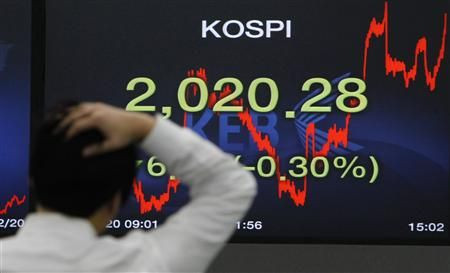Bank of South Korea Unexpectedly Cuts Interest Rate To 3%

South Korea's central bank cut the interest rate Thursday for the first time in over three years in a move to stimulate the faltering economic growth of the country.
The Bank of Korea (BoK) said that it had decided to cut the interest rate by 25 basis points to 3 percent. This easing in the monetary policy is seen as a much-needed thrust to boost liquidity in the financial system and help the economy regain its growth momentum.
However, market participants were rather discouraged by this decision as it hinted at an uncertain economic growth in the country. After the announcement, South Korea's KOSPI Composite Index declined 0.71 percent or 13 points to 1813.39.
Last month, the BoK noted that the risk to growth went up due to the escalation in the euro zone crisis. The Asian Development Bank (ADB) reported in April that the country's economic growth was expected to slow down as its exports were going to be badly impacted by the decreasing global demand.
In April, South Korea's central bank lowered the country's growth forecast for 2012 to 3.5 percent on account of the global economic slowdown that has resulted in the weakening of exports. In its revised 2012 economic outlook, the BoK said that it was lowering the 3.7 percent growth projection made in December.
One major reason for the interest rate cut should be the diminishing worry about inflation because it can help the government invigorate growth without much concern about the rising prices. Headline consumer price index was 2.2 percent year-over-year in June (the lower half of the central bank's 2 percent to 4 percent target range) while core inflation of 1.5 percent was the lowest over the last year.
Inflation may no longer be the main concern of policymakers, and the government may have more space to loosen monetary policies and make supporting economic growth a priority. Instead of fighting inflation, the most urgent priority for South Korea appears to be the pro-growth policy stance against the current uncertain global situation.
© Copyright IBTimes 2025. All rights reserved.





















